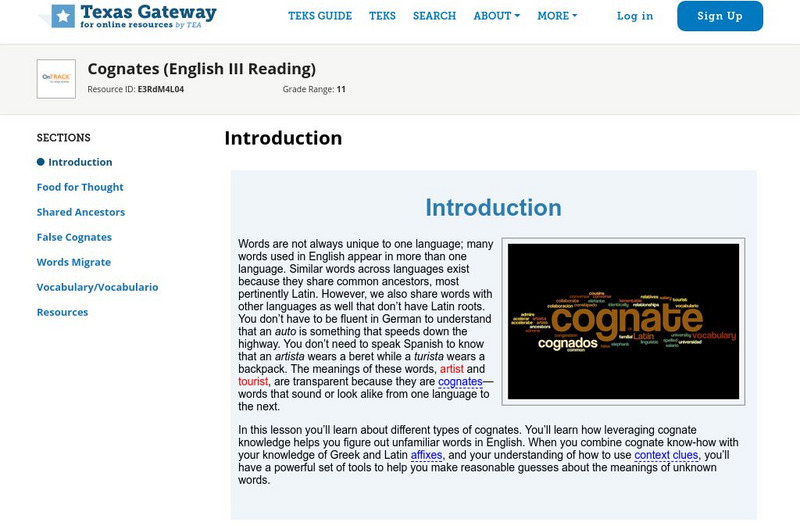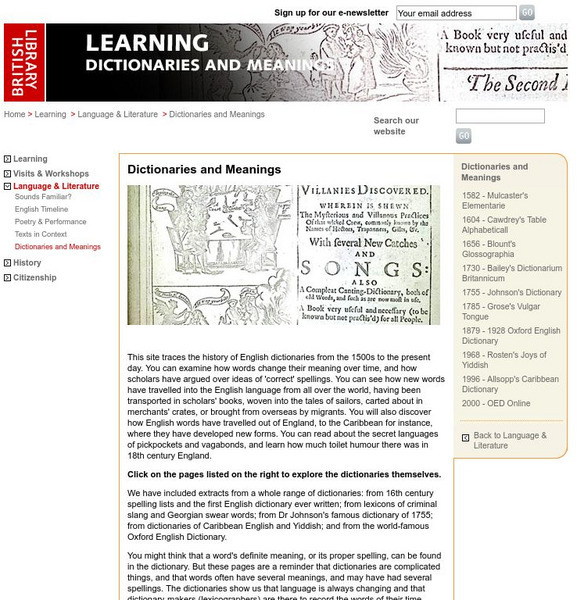Texas Education Agency
Texas Gateway: Origins and Meanings of Foreign Words and Phrases
Become acquainted with the origins and meanings of foreign words and phrases frequently used in English texts.
Texas Education Agency
Texas Gateway: Cognates (English Iii Reading)
In this lesson you'll learn about different types of cognates, words that sound or look alike from one language to the next. You'll learn how leveraging cognate knowledge helps you figure out unfamiliar words in English. When you combine...
Texas Education Agency
Texas Gateway: Cognates (English Ii Reading)
This lesson focuses on cognates, or words from other languages that have similar spellings, pronunciations, and meanings. This means that if you know, or are studying, another language, you may recognize an English word simply because...
Other
The Phrase Finder: Meanings and Origins of Phrases
The free section of this site provides the meanings and origins of thousands of quotations, euphemisms, popular fallacies and misheard song lyrics. A British site, some of the expressions are not familiar to most Americans.
Exploratorium
Exploratorium: Where Do Languages Come From?
A most interesting site! Explore why the French speak French in France and the English speak English in England and lots of other information on the history of words and languages.
British Library
British Library: Language & Literature: Dictionaries and Meanings
Article discusses the history of English dictionaries over a five-hundred-year period. Includes selections from Samuel Johnson's dictionary of 1755 and the Oxford English Dictionary. With useful comments about the origins of words,...
University of Alberta
University of Alberta: Zoology Latin and Greek Roots Index
This University of Alberta site features Latin and Greek roots for zoological terms. The index is divided alphabetically.
TED Talks
Ted: Ted Ed: Mysteries of Vernacular: X Ray
The story of the word X-Ray is one of great thinkers. French philosopher Rene Descartes isolated the letters X, Y and Z to stand for unknowns, and centuries later, Wilhelm Rontgen discovered the X-ray, using the X for the unknown nature...
TED Talks
Ted: Ted Ed: A Brief History of Melancholy
If you are a living, breathing human being, chances are you have felt sad at least a few times in your life. But what exactly is melancholy, and what (if anything) should we do about it? Courtney Stephens details our still-evolving...
TED Talks
Ted: Ted Ed: The True Story of 'True'
The older the word, the longer (and more fascinating) the story. With roots in Old English, 'true' shares etymological ancestors with words like betroth and truce, but also with the word tree. In fact, trees have been metaphors for...
TED Talks
Ted: Ted Ed: Mysteries of Vernacular: Odd
Whether we're talking all things unusual or mathematical, the origins of the word odd point to the Indo-European root uzdho, which means pointing upwards. Jessica Oreck and Rachael Teel explain the evolution from the term for a triangle...
TED Talks
Ted: Ted Ed: Mysteries of Vernacular: Lady
Why do we call women ladies? Well, etymologically-speaking, the word comes from the Old English words for hlaf (bread) and daege (maid), which, combined, mean the female head of the household and eventually indicated high social...
TED Talks
Ted: Ted Ed: Mysteries of Vernacular: Robot
In 1920, Czech writer Karel Capek wrote a play about human-like machines, thereby inventing the term robot from the Central European word for forced labor. Jessica Oreck and Rachael Teel explain how the science fiction staple earned its...
TED Talks
Ted: Ted Ed: Mysteries of Vernacular: Bewilder
The history of the word bewilder is more straightforward than you might think. Roots can be traced back to the Old English words wilde (undomesticated) and deor (untamed animals), eventually combined into the word wilderness. Jessica...
TED Talks
Ted: Ted Ed: Mysteries of Vernacular: Keister
Originally meaning a woven container, the word keister has roots all over the place. The devil's tool box? Sure. A safe? That too. So, how did it become associated with the buttocks? Jessica Oreck and Rachael Teel get to the bottom of...
TED Talks
Ted: Ted Ed: Mysteries of Vernacular: Sarcophagus
Dating back to the early Roman Empire, the word sarcophagus originally referred to the limestone a coffin was made of, rather than the coffin itself. From flesh-eating stone to a stone coffin, Jessica Oreck and Rachael Teel unbury the...
TED Talks
Ted: Ted Ed: A Brief History of Plural Word S
All it takes is a simple S to make most English words plural. But it hasn't always worked that way (and there are, of course, exceptions). John McWhorter looks back to the good old days when English was newly split from German -- and...
TED Talks
Ted: Ted Ed: Mysteries of Vernacular: Fizzle
From a stinky and crude inception, the word fizzle's history is nothing to poo poo at. Jessica Oreck and Rachael Teel track the road from flatulence to its modern meaning of a failure or weak ending. [1:50]
TED Talks
Ted: Ted Ed: Mysteries of Vernacular: Jade
Now known for its beauty and green hue, the stone jade was previously thought to espouse magical properties, such as kidney treatment. Jessica Oreck and Rachael Teel explain the word's travels from 15th century to Spain to today. [2:07]
TED Talks
Ted: Ted Ed: Mysteries of Vernacular: Quarantine
Stemming from the days of bubonic plague in Medieval Europe, quarantines were originally used to prevent potentially plague-infested ships from disembarking at a port city. Jessica Oreck and Rachael Teel explain how the length of the...
TED Talks
Ted: Ted Ed: Mysteries of Vernacular: Gorgeous
From whirlpools and ravines to superlative beauty, what is the trajectory of the word gorgeous? Jessica Oreck and Rachael Teel reveal the surprising variations in meaning. [2:00]
TED Talks
Ted: Ted Ed: Mysteries of Vernacular: Dynamite
With an explosive meaning, the word dynamite's past is as historical as it is etymological. Jessica Oreck and Rachael Teel describe how Alfred Nobel invented dynamite. [2:14]
TED Talks
Ted: Ted Ed: Mysteries of Vernacular: Inaugurate
From avian omens to the beginning of a new policy or the reign of a new politician, Jessica Oreck follows the flight path of the word inaugurate. [2:08]
TED Talks
Ted: Ted Ed: Mysteries of Vernacular: Earwig
An earwig is neither an ear nor a wig; it is an insect. Jessica Oreck and Rachael Teel explain how folklore gave this bug its name, combining entomology with etymology. [2:16]

























